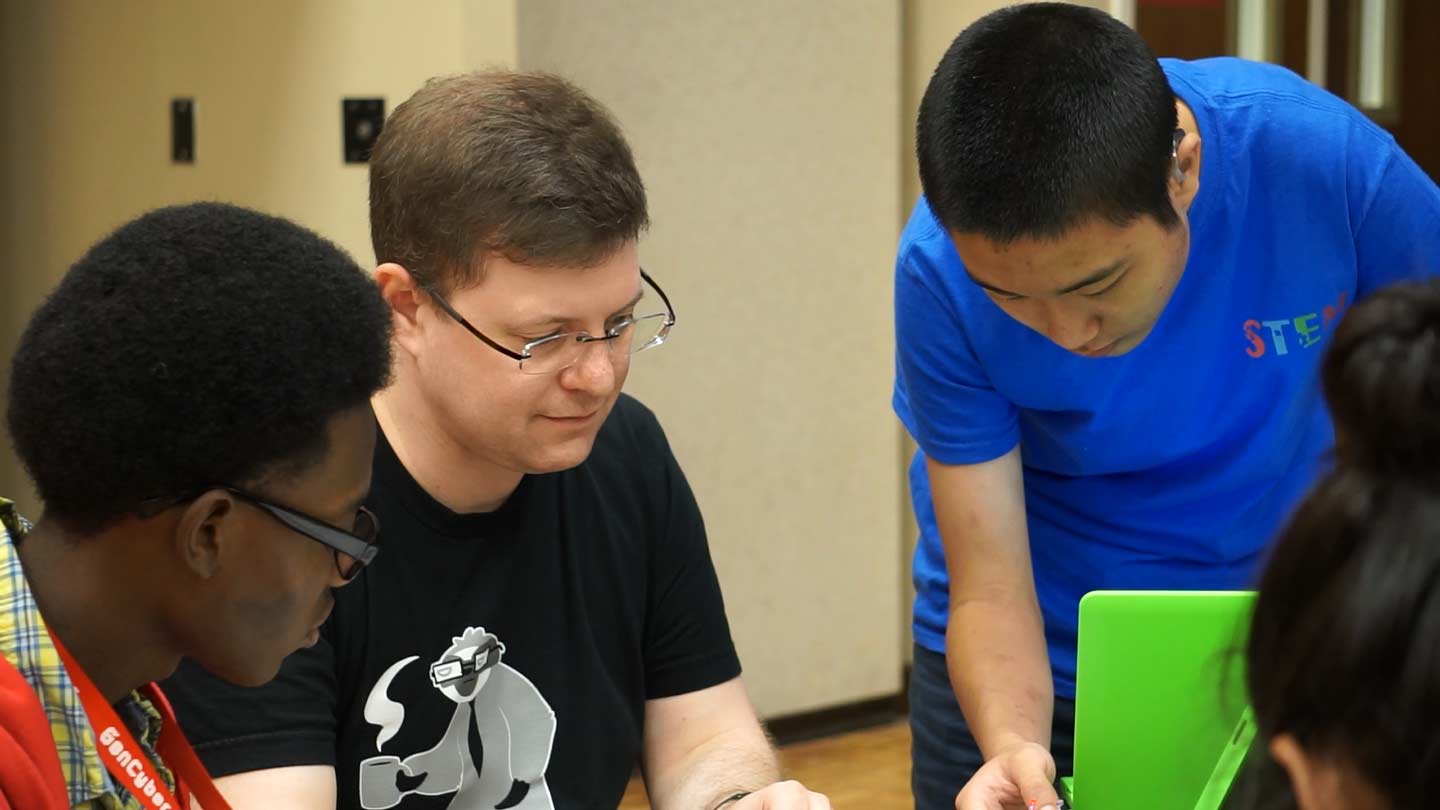
From left, James Hunter Jr., Bill Sabados and Andy Su work on a cybersecurity problem at the Gencyber camp.
Eighteen deaf and hard of hearing high school students from Alabama, Florida, Georgia, Mississippi and North Carolina have been attending a residential GenCyber cybersecurity camp this week at The University of Alabama in Huntsville (UAH) that is the first of its kind.
UAH’s Center for Cybersecurity Research and Education (CCRE) and the Alabama Institute for Deaf and Blind (AIDB) collaborated to offer the camp. The camp was funded by a grant from the National Science Foundation (NSF) and the National Security Agency (NSA) Gencyber program.
Gencyber is a program sponsored by the NSA and NSF that attempts to expose students to cyber security, computer science, and Science, Technology, Engineering and Math (STEM).
"There are tremendous financial implications for training students in STEM-based careers. Students who possess STEM related/cybersecurity skills are in high demand," says Dennis Gilliam, special projects director at AIDB. "These skills translate into employability and increased earning potential. By doing training such as GenCyber, we are opening the door to STEM for students who are deaf and hard-of-hearing who otherwise may not have this experience or opportunity."
This year, NSA and NSF sponsored 140 Gencyber camps across the country. The UAH/AIDB Gencyber camp is the first Gencyber camp to serve deaf and hard of hearing students.
"Deaf and hard of hearing students are not exposed to STEM career opportunities at the same rate as mainstream children. But these students are every bit as capable, and cybersecurity is a great career fit," says Dr. Tommy Morris, the camp’s director, who is an associate professor in the Department of Electrical and Computer Engineering and director of the CCRE. "We have been very impressed with the studiousness and technological talent of the campers. They are focused and excited about cybersecurity. Having such good campers makes our job easy."
The UAH CCRE team developed the cybersecurity curriculum and provided instructors for the camp. Curriculum includes an introduction to cybersecurity first principles, networking, computer building blocks, programming, ethics, cybersecurity careers and cybersecurity threats. Instructors provide brief lectures, but most of the camp is comprised of hands-on activities.
"We designed our camp curriculum to avoid lecturing when possible, with a focus on hands-on group and individual activities," says Jesse Hairston, lead camp instructor and CCRE research scientist. "One of my favorite things about camp was giving the students a project, then pacing the room to help students directly. Our large two-to-three staff-to-student ratio allowed our team to provide individual attention to each student."
The UAH Systems Management and Protection Center (SMAP) helped with the camp by providing two instructors and conducting a roundtable technology demonstration that allowed students to experience weather balloons, droids, drones, 3D printing and immersive video gaming technologies.
"I thoroughly enjoyed working with the deaf and hard-of-hearing students with my experience in electrical and mechanical engineering," says Steven Forney, a camp instructor and research associate at SMAP who is also deaf. "It is a unique opportunity to develop key skills for students to learn that often they don't find in their high school, including skills such as multitasking, communicating, learning to work with a team and working with someone that they haven't met before."
The camp has been fun and rewarding, says Dr. Bill Sabados, a camp instructor and SMAP research scientist.
"This experience really drives home the point that barriers to communication are not indicators of ability," says Dr. Sabados. "If both the instructors and campers make an effort to understand and be understood, the campers are equal to the challenge and ready to tackle the material."
Nighttime activities for the residential campers have been managed by AIDB, and have included hiking Monte Sano, experiencing an open-captioned movie in a local theater, bowling, enjoying a cybersecurity themed escape room and watching a movie on the campus lawn.
The AIDB team helped market the camp to students throughout the Southeast. The Rochester Institute of Technology National Technical Institute for the Deaf (NTID) helped to recruit students. AIDB instructors and American Sign Language interpreters are also working at the camp. The AIDB team helped UAH instructors gear class materials to the deaf and hard of hearing audience.
Contact
Dr. Tommy Morris
256.824.6567
tommy.morris@uah.edu
Jim Steele
256.824.2772
jim.steele@uah.edu
